Our submission to the EC 2025 Rule of Law report
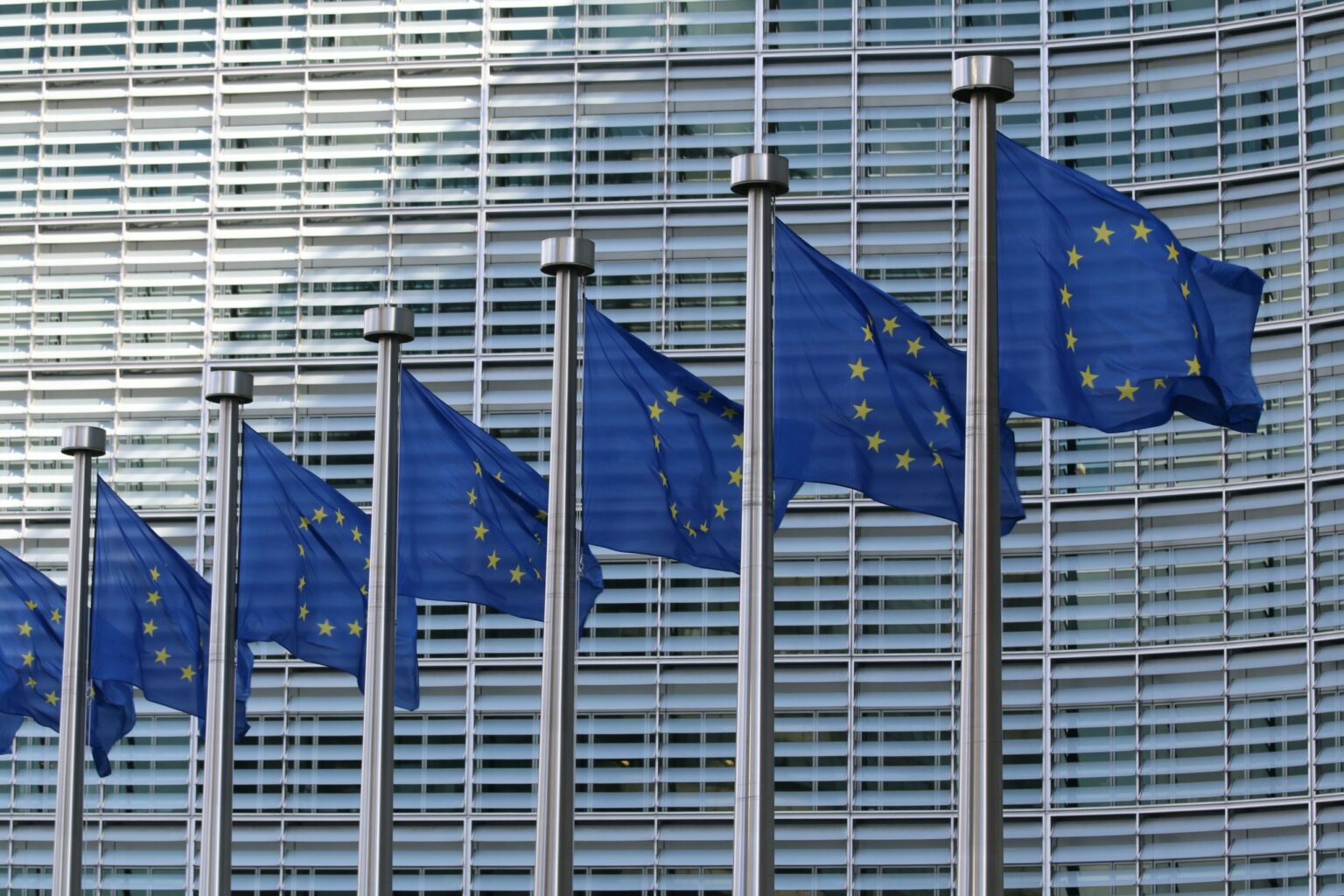
After a year of elections across the EU, threats to democracy and the rule of law are growing both in Europe and globally. Our submission highlights more clearly than ever the connection between these threats and the instrumentalisation of LGBTI people.
Disinformation, hate speech, and discriminatory political discourse have surged in many countries, directly impacting the lives of LGBTI people. At the same time, violence and restrictive legislation against LGBTI individuals are increasing, undermining the rule of law.
Our submission to the EC 2024 Rule of Law report
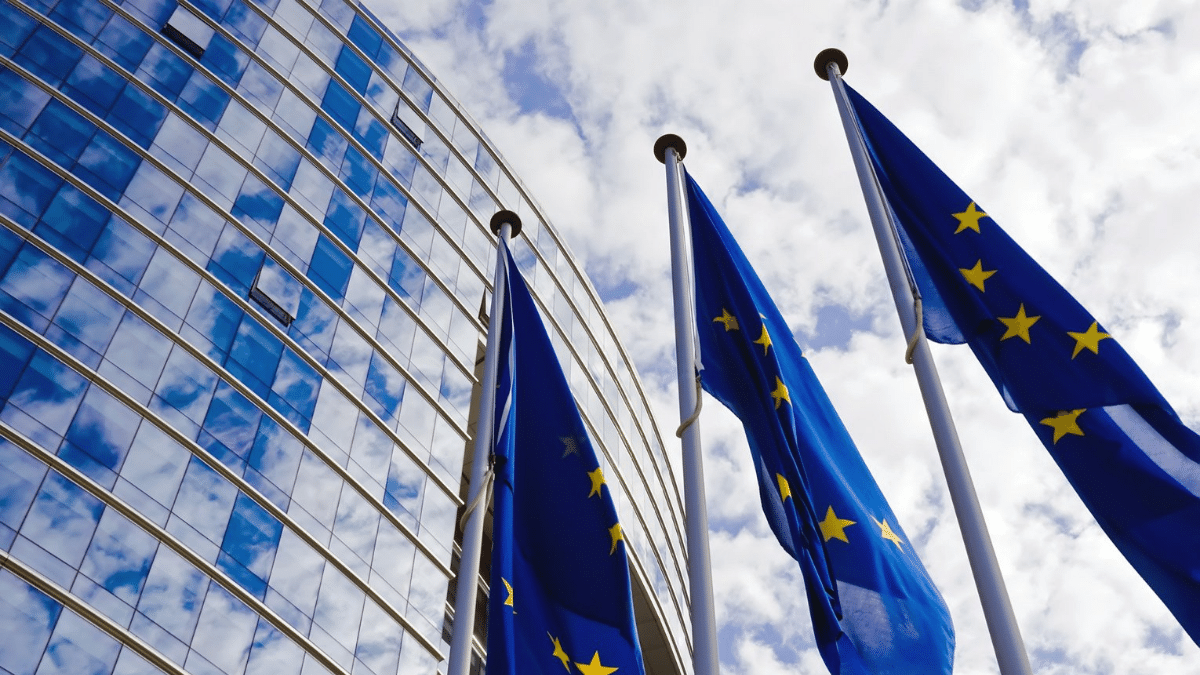
Over the past few years it has become increasingly clear that many government-led violations of LGBTI rights in EU Member States go hand-in-hand with an undermining of the rule of law and democracy. This includes in particular the degradation of the independence of judicial systems and the media landscape.
Particularly stark among this year’s submissions is the continual problem of non-implementation of European court judgments, especially around the right of LGBTI people to respect for their private and family life and the best interests of their children, as well as judgments related to legal gender recognition.
Efforts by authorities to restrict civic space; legal harassment, threats, hate speech and smear campaigns against LGBTI human rights defenders; and inadequate implementation of hate crime and anti-discrimination laws also remained prominent in 2023.
The 5 largest attacks on the fundamental rights of LGBTI people in the EU last year
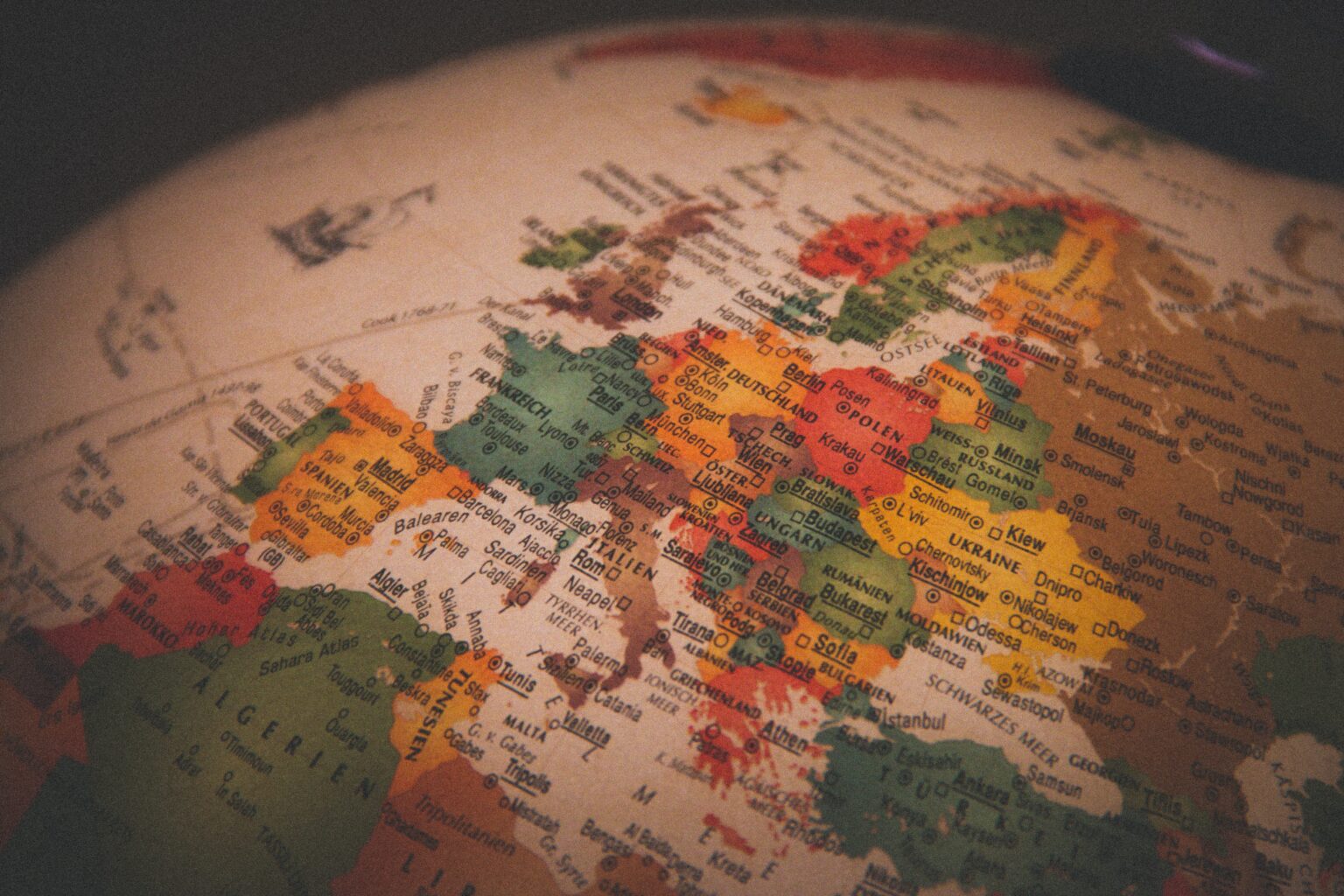
In our submission to the European Commission’s annual Rule of Law report, we’ve identified key trends in the systematic attacks on the rights of LGBTI people across EU member states, and what can be done to counteract them.
Do you know about the EU’s Rule of Law mechanism? It can be used to ensure EU institutions react strongly against LGBTI rights violations across its member states. In the EU, rule of law means that all members of a society, including governments and members of parliaments, are equally subject to the law, under the control of independent and impartial courts.
The rule of law is important because it has a direct impact on the life of every citizen of the EU, and it ensures that laws protecting fundamental rights and democracy are respected by everyone, and can be enjoyed by everyone. It is a fundamental value upon which the EU is based.
Over the past few years it has become increasingly clear that many government-led violations of LGBTI rights in EU member states, go hand-in-hand with an undermining of the rule of law. In ILGA-Europe’s submission to this year’s EU Rule of Law Report, we’ve reported on the systematic attacks on the fundamental rights of LGBTI people across the EU, which have been enabled by the weakening of rule of law and democratic structures in several member states.
ILGA-Europe, with the input of various national-level LGBTI organisations, has submitted written input to inform the 2023 annual report, in order to ensure the violations of LGBTI rights linked to rule of law deterioration are recognised by EU institutions, and are addressed in their follow-up with member states. Here are the trends which we have highlighted to the EC:
Anti-LGBTI bias
In countries where the freedom of the judiciary is weakened, we have been witnessing political interference or bias in court cases related to LGBTI rights. For example, in Poland, the Ministry of Justice uses its powers to repeatedly appeal verdicts that were in favour of LGBTI defendants.
Also, in countries where media freedom is under attack, we are seeing more prevalence of anti-LGBTI bias, smear campaigns and even censorship of LGBTI content.
Harassment and intimidation of LGBTI human rights defenders
Across the EU, hate speech by politicians was a serious issue during 2022, creating an unsafe environment for LGBTI human rights defenders and often related to a rise in hate crime and hate speech against LGBTI people more broadly. LGBTI human rights defenders are still targeted by strategic litigation against public participation (SLAPP) cases, which aim to intimidate activists and journalists to prevent them publishing information about attacks on LGBTI rights. In addition, we saw in Poland that the prosecutor’s office used tactics to intimidate not only LGBTI people ahead of court cases but also judges presiding over cases related to LGBTI rights.
Anti-LGBTI legislation
Legislation aimed at rolling back the rights of LGBTI people continued to be tabled in 2022. The most well-known example of such legislation is the anti-paedophilia legislation adopted by Hungary in June 2021, which includes provisions which ban the “portrayal and the promotion of gender identity different from sex at birth, the change of sex and homosexuality” for persons under 18, and applies these to a number of regulations related to child protection, family, education, media and advertisement.
The European Commission started infringement proceedings against Hungary due to this law in July 2021, taking it to the Court of Justice of the European Union (CJEU) in July 2022. A similar law has since been tabled in Slovakia and Romania, while Poland has drafted a number of laws restricting rights of LGBTI people and currently in Bulgaria draft legislation aims to restrict the functioning of civil society in general.
Judgments are not implemented
Judgments of the Court of Justice of the EU (CJEU) or the European Court of Human Rights (ECtHR) continued to not be implemented last year. The most notable of these is the Coman case from 2018, on freedom of movement for same-sex spouses. Due to its non-implementation in Romania, the country where the case started, it has been taken to the ECtHR. An official complaint was also submitted to the European Commission, with a similar case.
Hate crimes are not investigated
Hate crimes against LGBTI people often are still not sufficiently investigated. A number of EU countries still do not have hate crime legislation with sexual orientation, gender identity or sex characteristics as aggravating grounds. In some countries which do have such legal protection, it is often not implemented properly by police, prosecutors or even Ombudspersons.
So, what can be done?
The EU has a number of tools at its disposal to ensure the respect of the rule of law in all EU countries. The European Commission (EC), the executive arm of the EU, is responsible for guaranteeing the respect of rule of law.
The EU can take specific steps against violations of LGBTI rights in member states, that is if they go against EU legislation and/or if they are rule of law violations. Instruments the EC can use in such cases include so-called infringement procedures, as we see against Hungary and Poland at the moment, triggering Article 7 of the Treaty of the EU, to suspend certain rights from a member state, as well as cuts in EU funding based on rule of law violations.
The EU annual rule of law report highlights breaches of EU and national law, including erosion of democratic standards. Based on this report, the EU institutions talk with EU countries, as well as national parliaments, civil society and other stakeholders in order to address concerns and avoid deterioration.
We hope that our remarks are heard and that the EC will integrate them in its annual Rule of Law Report. LGBTI rights are human rights and must be protected the same way rule of law should be respected in every EU country.
Our submission to the EC 2023 Rule of Law report
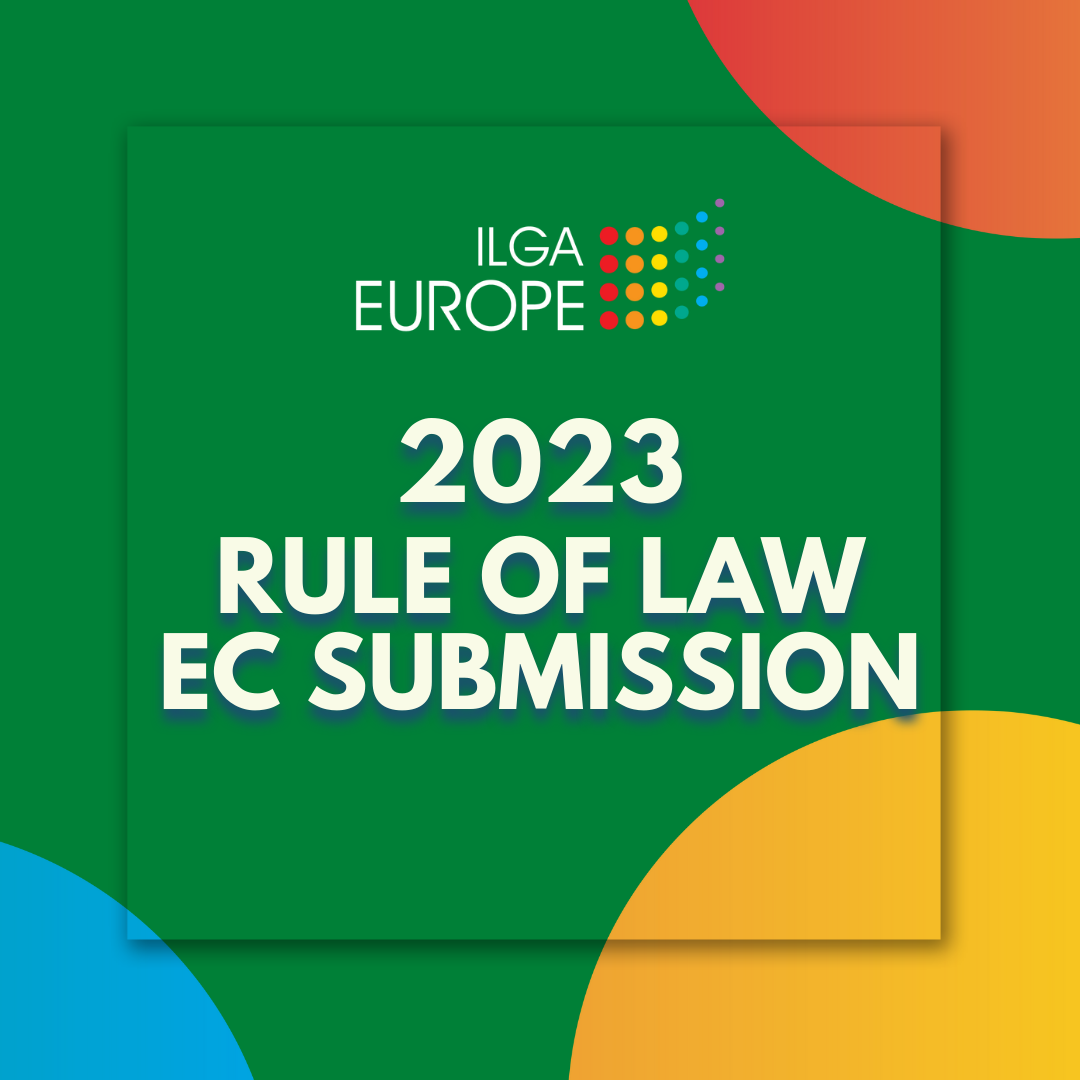
The submission covers developments in eight EU Member States as regards rule of law developments in the countries which have had an impact on the fundamental rights of LGBTI people and their democratic participation, with a focus on the past year (2022).
We have kept our inputs relevant to the content asked for by the consultation, and therefore we have not included all fundamental rights violations against LGBTI people, or all restrictions experienced by LGBTI civil society in the respective countries. We have only included them where there is a clear link to the issues of rule of law contained in the consultation.
Notably the submission covers the following topics:
- Manipulation of judicial processes to attempt to erode the human rights of LGBTI people and their access to justice;
- Politicians attempting to discredit and delegitimise the rulings of courts that uphold the rights of LGBTI people;
- Harassment and intimidation of LGBTI human rights defenders by law enforcement/prosecution services;
- Smear campaigns and negative narratives against LGBTI people, particularly where independence of media is threatened;
- SLAPPs against activists or journalists reporting on topics of public interest related to LGBTI;
- Censorship of LGBTI content;
- Tabling and adoption of laws aiming to reduce fundamental rights of LGBTI people;
- Tabling of laws aimed at restricting the functioning of civil society organistions;
- Arbitrary application of Covid-19 regulations to attempt to restrict the freedom of assembly of LGBTI people;
- Continued non-implementation of CJEU or ECtHR judgements which would improve the lives of LGBTI people;
- Anti-LGBTI discriminatory speech from political and religious leaders affecting public perception of LGBTI CSOs and creating an unsafe climate for LGBTI human rights defenders;
- Insufficient implementation of legal protection (e.g. protection against hate crime) for LGBTI people by responsible services, sometimes including Ombudspersons.
The 5 trending attacks on the fundamental rights of LGBTI people in the EU in 2021
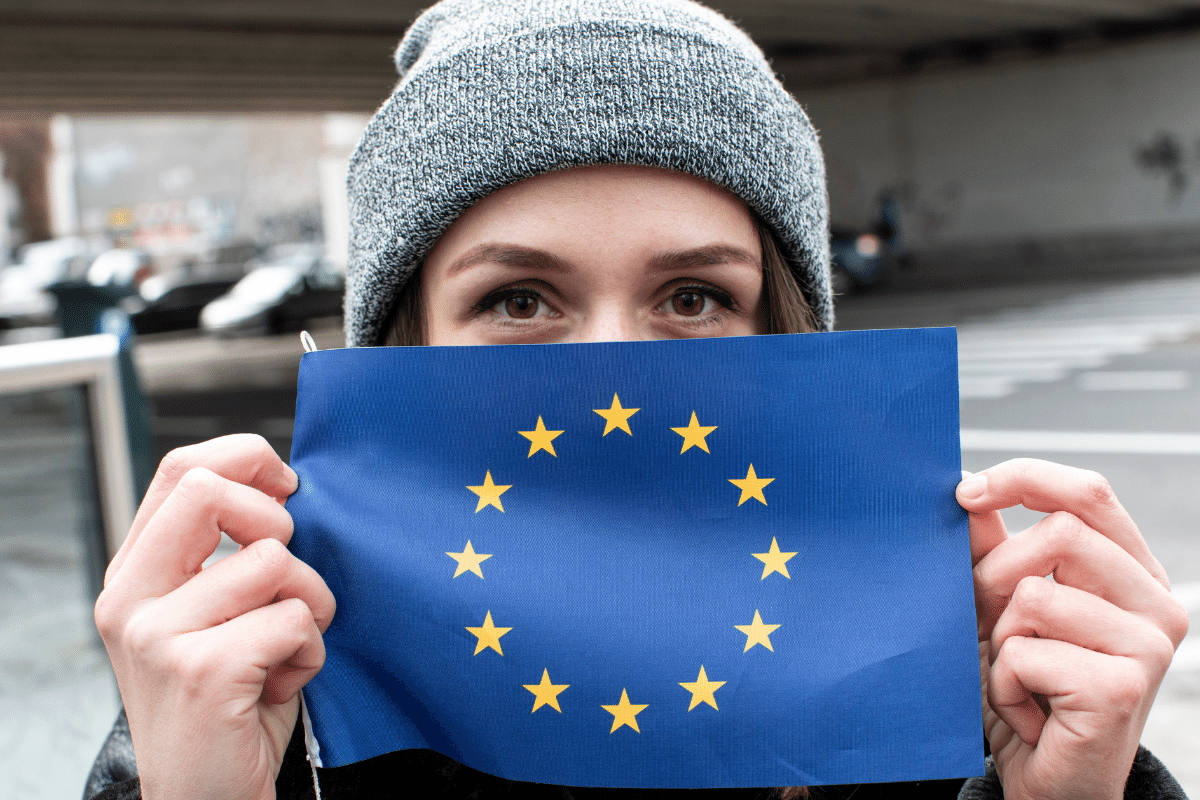
Right now, as the war on Ukraine escalates, democracy, human rights and equality matter more than ever in Europe. In our submission to the European Commission’s annual Rule of Law report, we’ve identified key trends in the systematic attacks on the rights of LGBTI people across EU member states.
With the ongoing Russian invasion of Ukraine, which is also a fundamental attack on democracy and freedom, we need to be working harder than ever to protect human rights and equality in Europe. The EU’s Rule of Law mechanism is one way in which this can be done. It can be used to ensure EU institutions react strongly to human rights violations across its member states. In the EU, rule of law means that all members of a society, including governments and members of parliaments, are equally subject to the law, under the control of independent and impartial courts.
The rule of law is important because it has a direct impact on the life of every citizen of the EU, and it ensures that laws protecting fundamental rights and democracy are respected by everyone, and can be enjoyed by everyone. It is a fundamental value upon which the EU is based.
Over the past few years it has become increasingly clear that many government-led violations of LGBTI rights in EU member states, go hand-in-hand with an undermining of the rule of law. In ILGA-Europe’s submission to this year’s EU Rule of Law Report, we’ve reported on the systematic attacks on the fundamental rights of LGBTI people across the EU, which have been enabled by the weakening of rule of law and democratic structures in several member states.
ILGA-Europe, with the input of various national-level LGBTI organisations, has submitted written input to inform the 2022 annual report, in order to ensure the violations of LGBTI rights linked to rule of law deterioration are recognised by EU institutions, and are addressed in their follow-up with member states. Here are the trends which we have highlighted to the EC:
Anti-LGBTI bias
In countries where the freedom of the judiciary is weakened, we have been witnessing political interference or bias in court cases related to LGBTI rights. For example, in Poland, the Ministry of Justice uses its powers to repeatedly appeal verdicts that were in favour of LGBTI defendants.
Also, in countries where media freedom is under attack, we are seeing more prevalence of anti-LGBTI bias, smear campaigns and even censorship of LGBTI content. Some LGBTI organisations are facing funding restrictions.
Arbitrary use of COVID-19 regulations
In certain countries, COVID-19 regulations have been applied in a discriminatory manner or have been used arbitrarily to restrict the freedom of assembly of LGBTI people. States of emergency have allowed governments to fast-track legislation unrelated to the pandemic, but which directly attack the rights of LGBTI people.
The most well-known example of this is the anti-paedophilia legislation adopted by Hungary in June 2021, which includes provisions which ban the “portrayal and the promotion of gender identity different from sex at birth, the change of sex and homosexuality” for persons under 18, and applies these to a number of regulations related to child protection, family, education, media and advertisement.
The European Commission started infringement proceedings against Hungary due to this law in July 2021. A similar law has since been tabled in Slovakia, is being drafted in Romania, and has been suggested for drafting in Poland and Croatia.
Judgments are not implemented
Judgments of the Court of Justice of the EU (CJEU) or the European Court of Human Rights (ECtHR) continued to not be implemented last year. The most notable of these is the Coman case from 2018, on freedom of movement for same-sex spouses. Due to its non-implementation in Romania, the country where the case started, it has been taken to the ECtHR. An official complaint was also submitted to the European Commission, with a similar case.
Rise in hate crime and hate speech against LGBTI people
Across the EU, hate speech by politicians was a serious issue during 2021, creating an unsafe environment for LGBTI civil society and often being related to a rise in hate crime and hate speech against LGBTI people more broadly. In some EU countries, LGBTI activists are receiving death threats online. In 2021 alone, offices of LGBTI organisations were attacked in Belgium, Bulgaria, Ireland, the Netherlands, Romania, and Spain. Staff and volunteers of LGBTI organisations were also attacked in Bulgaria, Croatia, Finland, Lithuania, Romania and Slovenia, many of which happened after anti-LGBTI smear campaigns in the media. Stickers with the design of the Polish “LGBT-free Zone” sticker appeared in various cities in Belgium, Bulgaria and Latvia. These incidents have led to an effective restriction of LGBTI people’s right to freedom of association, freedom of assembly and freedom of expression.
Hate crimes are not investigated
Hate crimes against LGBTI people often are still not sufficiently investigated. A number of EU countries still do not have hate crime legislation with sexual orientation, gender identity or sex characteristics as aggravating grounds. In some countries which do have such legal protection, it is often not implemented properly by police, prosecutors or even Ombudspersons.
So, what can be done?
The EU has a number of tools at its disposal to ensure the respect of the rule of law in all EU countries. The European Commission (EC), the executive arm of the EU, is responsible for guaranteeing the respect of rule of law.
The EU can take specific steps against violations of LGBTI rights in member states, that is if they go against EU legislation and/or if they are rule of law violations. Instruments the EC can use in such cases include so-called infringement procedures, as we see against Hungary and Poland at the moment, triggering Article 7 of the Treaty of the EU, to suspend certain rights from a member state, as well as cuts in EU funding based on rule of law violations
The EU annual rule of law report highlights breaches of EU and national law, including erosion of democratic standards. Based on this report, the EU institutions talk with EU countries, as well as national parliaments, civil society and other stakeholders in order to address concerns and avoid deterioration.
We hope that our remarks are heard and that the EC will integrate them in its annual Rule of Law Report. LGBTI rights are human rights and must be protected the same way rule of law should be respected in every EU country.
EU Ministers must act on the serious breach of EU’s rule of law and values in Poland
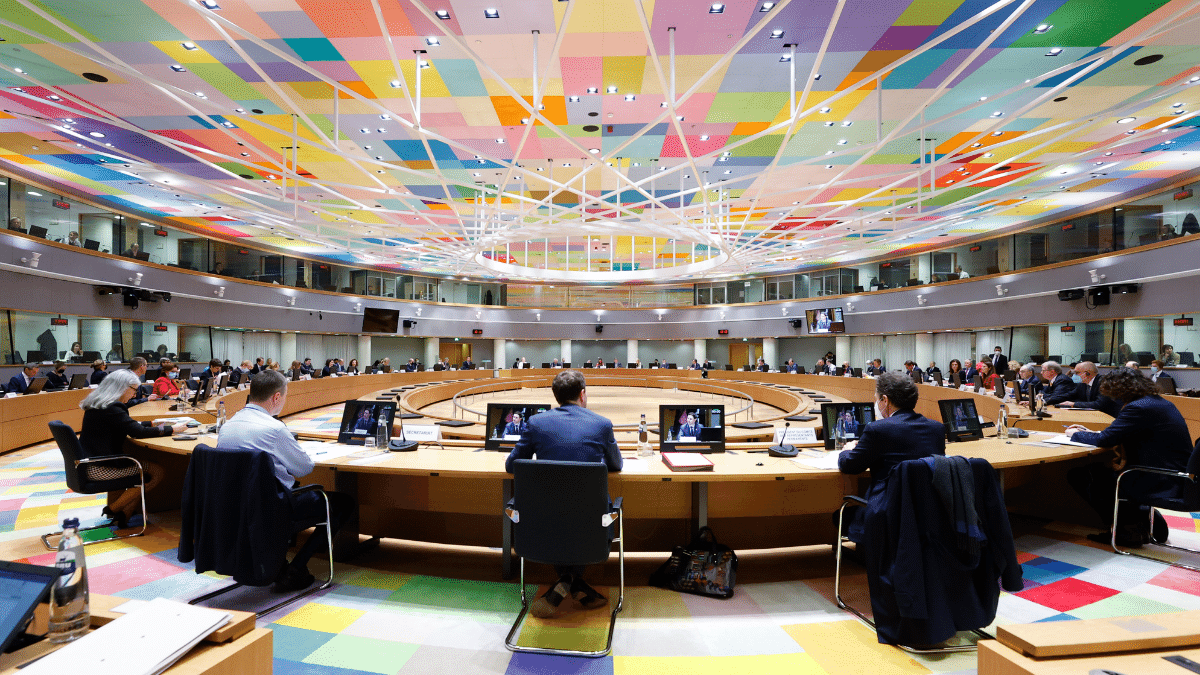
While Poland keeps attacking LGBTI people and their rights, ILGA-Europe have signed a joint letter along with 86 other NGOs asking EU Ministers to take action.
ILGA-Europe, along with 86 other NGOs, have written a letter to EU Ministers to act decisively on Poland’s rule of law crisis, ahead of the upcoming General Affairs Council meeting on Tuesday 22 February.
The letter addresses the major rule of law concerns in Poland, including media freedom, civic space, SRHR and LGBTI rights. It outlines how systemic rule of law violations have enabled Poland to directly attack the human rights of LGBTI people and their defenders.
In it, we all call for decisive action under Article 7 to protect rule of law, democracy and fundamental rights in Poland. This comes in light of the decision of the Court of Justice of the European Union (CJEU) on 16 February, which confirms the legality of the EU’s rule of law conditionality.
According to the judgement, member states now have the tools to properly and effectively defend the rule of law in Poland. We call for these tools to be used immediately and unequivocally.
Read the letter to EU Ministers.
Further information:
- Find out more about CJEU judgment of February 16
- Learn more in our submission to European Commission’s 2022 Rule of Law Report.
Our submission to the EC 2022 Rule of Law Report
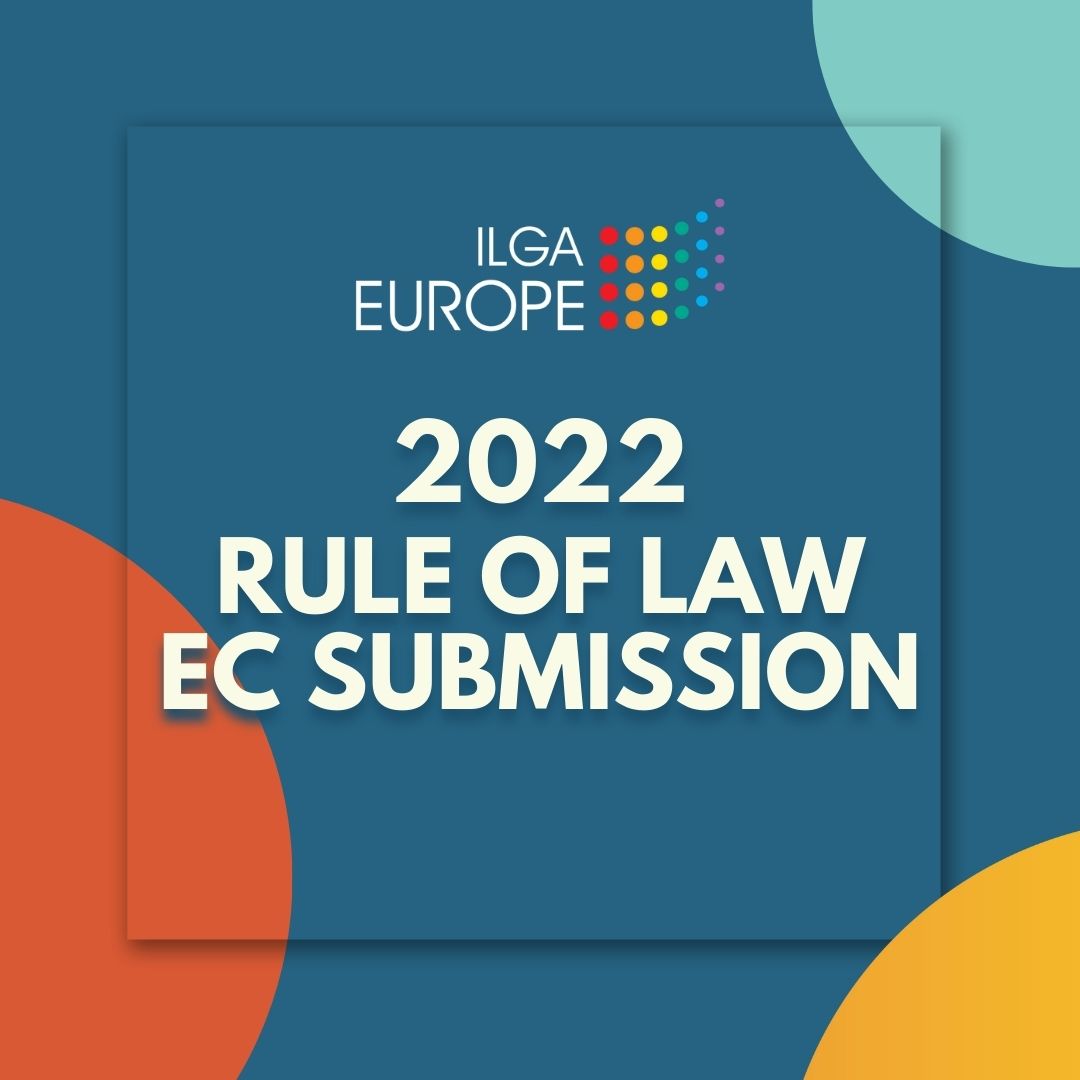
Expert contributions were provided by organisations PROUD (Czech Republic), LGBT komiteen (Denmark), Inter-LGBT (France), Háttér Társaság (Hungary), KPH & Atlas of Hate (Poland), ACCEPT (Romania), and Legebrita (Slovenia).
The developments encompassed in the submission point to systematic attacks on the fundamental rights of LGBTI people enabled by the weakening of rule of law and democratic structures. We have not included all fundamental rights violations against LGBTI people, or all restrictions experienced by LGBTI civil society in the respective countries, only those which are relevant to the respective headings of the consultation, where there is a clear link to rule of law.
Notably the submission covers the following topics:
- Political interference or bias in court cases related to LGBTI rights, in particular where independence of the judiciary is under attack;
- Anti-LGBTI bias, smear campaigns and censorship of LGBTI content, in particular where media freedom is under attack;
- Funding restrictions or discriminatory distribution of public or EU funds, affecting LGBTI organisations;
- Arbitrary application of Covid-19 regulations to attempt to restrict the freedom of assembly of LGBTI people;
- Covid-19 emergency measures affecting the process of preparing and enacting laws (exclusion of LGBTI CSOs in consultation phases or even fast-track adoption of legislation directly attacking LGBTI people);
- Non-implementation of CJEU or ECtHR judgements which would improve the lives of LGBTI people;
- Judicial harassment of LGBTI activists (in particular SLAPPs);
- Insufficient follow-up of anti-LGBTI hate crime cases;
- Anti-LGBTI discriminatory speech from political and religious leaders affecting public perception of LGBTI CSOs and creating an unsafe climate for LGBTI human rights defenders (in some cases leading to attacks on CSO offices, employees and volunteers).
Poland is violating the fundamental rights of EU citizens and blatantly disregarding EU treaties and standards

The European Commission and member states are duty bound to hold Poland accountable to EU Treaties, asserts ILGA-Europe, alongside two Polish equality organisations, in a legal complaint citing the violation of fundamental rights of the EU by inciting hatred and discrimination against LGBTI people.
On Monday 14 September, ILGA-Europe together with Polish LGBT rights organisations KPH (Campaign Against Homophobia) and Fundacja Równo?ci (The Equality Foundation) submitted a legal complaint to the European Commission about so-called Family Charters and LGBT Free Zones, which over 100 Polish local governments have adopted over the last two years.
The complaint sets out how these declarations introduce discrimination against LGBTI people and thus breach the European Council Directive (2000/78/EC), establishing a general framework for equal treatment in employment and occupation, as well as the Charter of Fundamental Rights Article 15 on Freedom to choose an occupation and right to engage in work, and Article 21 on non-discrimination.
At the same time, many Polish LGBTI people have begun to write to the European Commission, often anonymously out of fear of further stigmatisation and hate, putting forward individual complaints about how they are being discriminated against in the cities that have declared themselves LGBT-free Zones and adopted Family Charters. Over 400 individual complaints were sent to the European Commission by LGBTI persons, sharing their fears for employment, health and life and their stories of discrimination in Poland.
With this complaint, ILGA-Europe and partners provide the legal analysis of how these Charters do not, as claimed by the Polish Prime Minister in a recent letter to the European Commission, protect Polish families, but instead put in place active discrimination against LGBTI people. Although there is no clear individual court case claiming discrimination in recruitment or employment at this point, the analysis shows clearly how the principles of Directive 2000/78/EC and the Charter of Fundamental Rights are being violated.
According to KATRIN HUGENDUBEL, Advocacy Director of ILGA-EUROPE: “The European Commission and Council can no longer remain silent in the face of such blatant violations of the principle of non-discrimination by a member state. Our legal analysis of the texts of the Family Charter clearly dismantles their discriminatory nature. The European Commission is duty-bound to answer the Polish Prime Minister’s letter, clearly rejecting the argument of “defending Polish families” and addressing the real harm that is being perpetrated on LGBTI people in Poland. EU law is being violated and the EC needs to start infringement procedures.”
According to MIKO CZERWI?SKI from FUNDACJA RÓWNO??: “Working in so-called ‘LGBT-free Zones’ we see what detrimental effect this is having on LGBTI people. They are losing their jobs or contracts, are excluded from local communities and are being violently attacked in their own cities. Fundacja Równo?? have also submitted complaints to the EC as we were denied access to an EU-funded cultural centre with the argument that we wanted to hold an “ideological event”, while a homophobic event was allowed to go ahead. The examples of discrimination and violence provided in all of the 400 individual complaints sent to the EC show how seriously Poland is violating fundamental rights.”
According to MIROS?AWA MAKUCHOWSKA from CAMPAIGN AGAINST HOMOPHOBIA (KPH): “LGBT people living in so-called ‘LGBT-free Zones’ cannot wait any longer. Hundreds of complaints have been sent to EC as fundamental rights are being violated on a daily basis. It’s high time for both EC and the Council to act – the citizens are calling for the immediate trigger of infringement procedure and to finally act under the Article 7(1) TEU procedure.”
Poland’s Family Charters are only one element in the hate campaign that Polish LGBTI people have been subjected to since 2018. In the country’s presidential elections earlier this year, President Andrzej Duda degraded and scapegoated the LGBTI community in his campaign for election victory. This included claims that LGBT people “are not people, but ideology” and “more destructive than communism”, among other attempts at dehumanisation and incitement of hatred and fear. In the 2020 ILGA-Europe Rainbow Map, which benchmarks European countries in terms of LGBTI rights, Poland became the lowest ranking EU country, having lost points because LGBTI human rights defenders have been increasingly at risk, authorities have taken active measures to undermine civil society associations, and there have been attempts to ban public events.
Last week, the Polish Commissioner for Human Rights, published his investigation of the arrests and detention of 48 LGBTI activists, which took place over the weekend of 7-9 August 2020, identifying degrading treatment, bordering on inhumane, in arrest and detention, and breaches of fundamental rights as set out in the Treaty and the Charter of Fundamental Rights, including mistreatment, the right to legal help, to inform a close person, to access to medical help, and the right to information.
KATRIN HUGENDUBEL concludes: “We have seen first actions by the European Commission in August, when Commissioner Dalli rejected six applications for town twinning projects by local governments who have declared themselves LGBT-free zones, but we need a more coordinated and holistic response, both from the European Commission and the European Council.
EC President, Ursula von der Leyen will address the Parliament with her State of the Union speech tomorrow, Wednesday morning. What state is the Union in when Member States are freely violating the fundamental rights of EU citizens, and the principles of non-discrimination as set out in the Treaty?”
Joint Statement: Democracy under attack
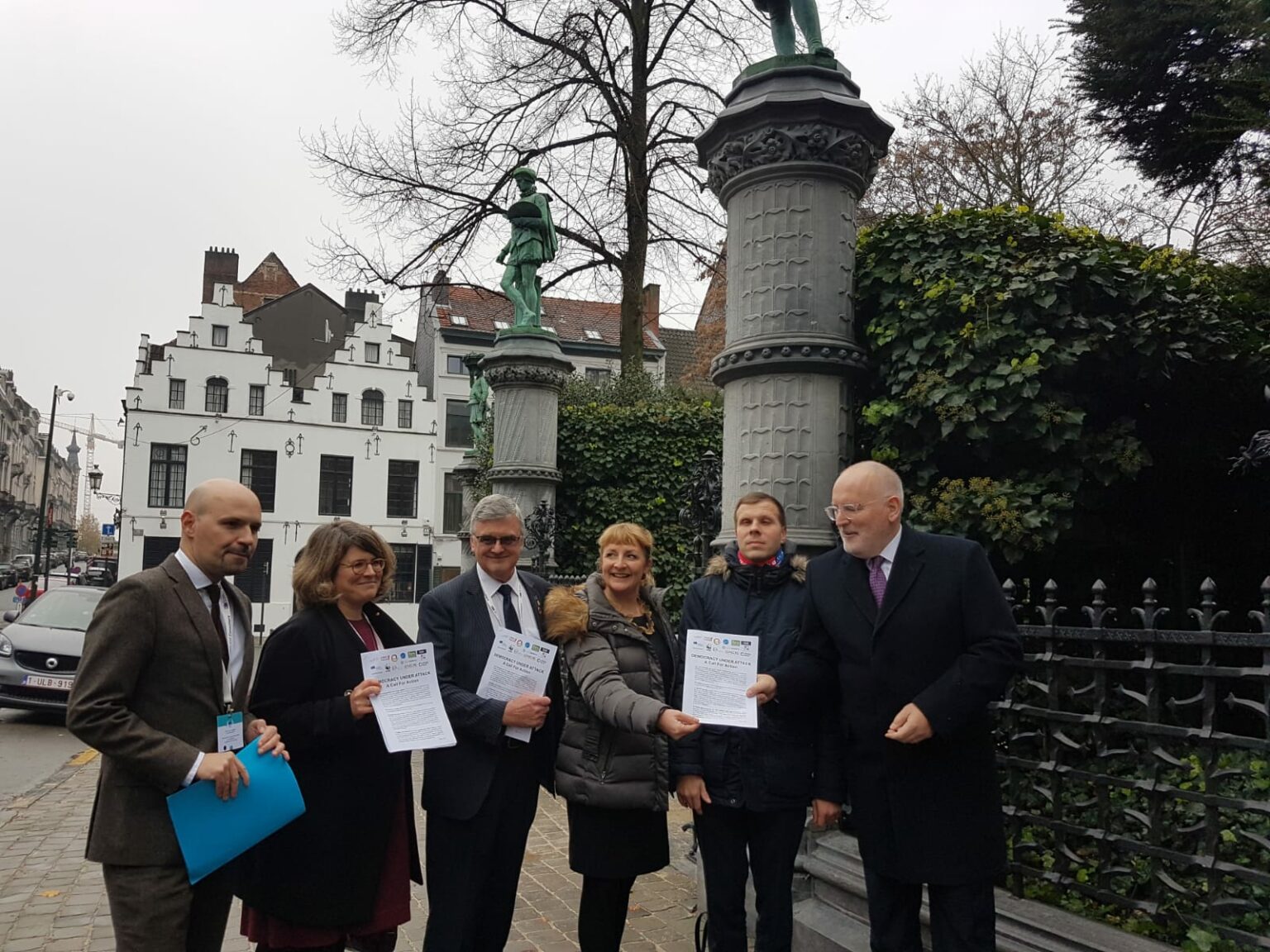
Fourteen civil society organisations -including ILGA-Europe- have written to the European Union and European governments to respond to the threat to our democracies in Europe.
“Our democracies are under attack. The rise of hate, divisive, and socially and environmentally destructive political forces– including in many EU countries – are putting our democracies at risk. They are undermining democratic institutions and the rule of law by fomenting inequality and discrimination and by seeking to muzzle independent media, non-governmental organisations, trade unions, the judiciary, women, and marginalised groups, including ethnic and religious minorities, LGBTI people and people with disabilities. Democracy should mean working in the best interests of all, and not of some at the expense of others with less power.”
“EU action is overdue. We the undersigned call on the European Union and European governments to respond to this threat and to:
- Uphold the rule of law.
- Apply zero tolerance for hate speech and cyber-violence.
- Defend the right for people to campaign for the public interest.”
Signatories:
- CONCORD Europe (with the special support of IPPF EN)
- European Anti-Poverty Network (EAPN)
- European Disability Forum (EDF)
- European Movement International
- European Trade Union Confederation (ETUC)
- European Women’s Lobby
- European Network Against Racism (ENAR)
- Fern
- Friends of the Earth Europe
- Greenpeace
- ILGA-Europe
- International Federation for Human Rights (FIDH)
- Social Platform
- WWF
Read the joint statement in full here.
European Parliament backs call for civil society supports in the EU
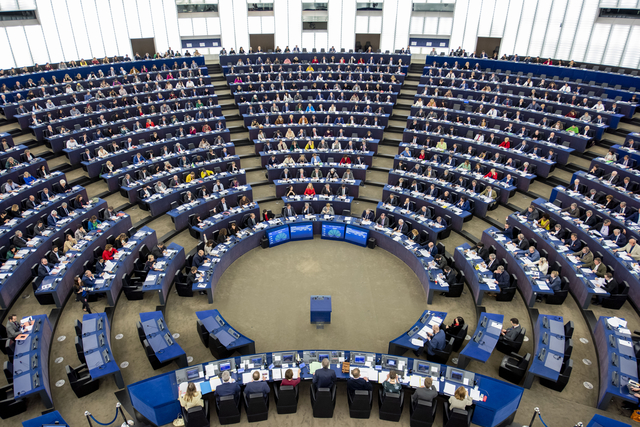
This morning, 489 MEPs voted in favour of an instrument to support civil society organisations which promote democracy, rule of law and fundamental rights.
Over 500 LGBTI organisations are members of our ILGA-Europe family – and the message coming from many of them for the past few years has been undeniable. Their work is getting harder, much harder.
Their ability to organise events with their local LGBTI community, as well as working in alliances for human rights and the rule of law in their countries, is reducing.
This is happening all over Europe – it’s not a problem that only exists outside the EU. We repeat: this is problem for the EU too.
And it’s not just ILGA-Europe who have observed this phenomenon – in January 2018, the FRA’s new report recognised shrinking space at an institutional level for the first time and said it needed to be urgently addressed.
One very practical way to better support civil society groups who are experiencing obstacles (whether direct or indirectly) is more flexible funding. There are several great mechanisms available for human rights defenders reworking outside the EU’s borders, including from DG NEAR and DG Devco – but nothing similar for EU-based civil society to turn to.
That is why ILGA-Europe is delighted to see that MEPs in Strasbourg today in a resolution clearly call for a funding mechanism for human rights organisations working in the EU. The European Parliament has shown that it understands the realities faced by activists working to create positive change in their communities. I
In her intervention in the debate in plenary on Tuesday, Commissioner Jourova also voiced her support for such an instrument and it is now up to the European Commission to include a European Values Instrument in its proposal for the next Multi-annual Financial Framework (or MFF). Such an instrument should allow for direct support for national organisations working on human rights and democracy in a flexible manner.